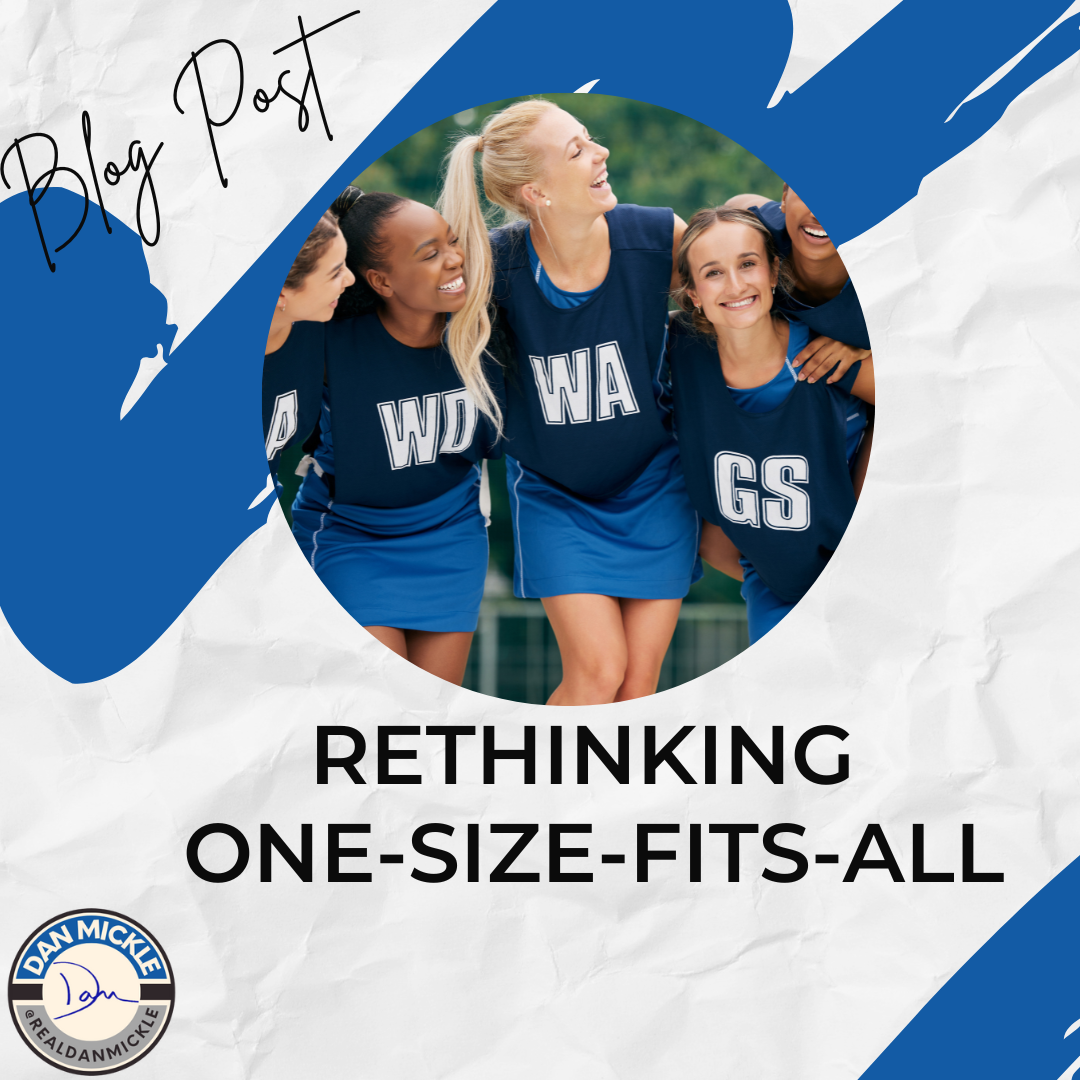Rethinking the ‘One-Size-Fits-All’ Practice Plan for Neurodivergent Athletes
Coaching neurodivergent athletes is one of the most rewarding—and humbling—experiences a coach can have. It challenges you to expand your toolkit, rethink conventional approaches, and, most importantly, embrace a mindset of flexibility and empathy. Yet, too often, practice plans follow a “one-size-fits-all” approach that leaves these athletes feeling excluded, overwhelmed, or misunderstood. Spoiler alert: those plans don’t work for anyone, but for neurodivergent athletes, they can be particularly counterproductive.
As a mental performance coach and advocate for inclusive coaching, I’m here to tell you it’s time to rethink how we approach practice planning. The neurodivergent community is rich with diverse thinkers, learners, and doers, and our coaching should reflect that diversity. Let’s explore how we can move beyond cookie-cutter strategies to create environments where all athletes thrive.
What Does Neurodivergence Mean?
Neurodivergence refers to variations in the way people think, learn, and process information. This includes individuals with conditions like autism, ADHD, dyslexia, sensory processing differences, and more. Neurodivergent athletes often have incredible strengths—such as creativity, hyper-focus, or out-of-the-box problem-solving—but they may also face challenges with communication, sensory overload, or adapting to rigid structures.
The key takeaway? There’s no single “right” way to learn or excel in sports. That’s why our practice plans must move beyond “what’s easiest for the coach” to “what’s best for the athlete.”
Why ‘One-Size-Fits-All’ Fails Neurodivergent Athletes
Imagine walking into a room where everyone is speaking a language you don’t understand. Now imagine that instead of teaching you the language, they just get louder, expecting you to figure it out. That’s how many neurodivergent athletes feel during traditional practices. Here’s why the “one-size-fits-all” approach often falls short:
- Rigid Schedules: Neurodivergent athletes may struggle with transitions, unexpected changes, or inflexible routines.
- Uniform Communication Styles: What works for one athlete might confuse or overwhelm another. Neurodivergent athletes often benefit from individualized communication strategies.
- Sensory Overload: Whistles, yelling, and chaotic drills can overwhelm athletes with sensory sensitivities, making it hard for them to focus or enjoy practice.
- Assumed Learning Styles: Many practice plans rely on verbal instructions or group demonstrations, which don’t resonate with all neurodivergent athletes.
The Case for Individualized Practice Plans
Every athlete deserves the chance to succeed, and that starts with meeting them where they are. Tailoring your practice plans to neurodivergent athletes isn’t just good coaching—it’s essential. Here’s why:
- Improved Engagement: When athletes feel seen and understood, they’re more likely to stay engaged and give their best effort.
- Enhanced Skill Development: Personalized approaches help athletes grasp concepts more effectively, leading to faster improvement.
- Inclusive Environments: Creating spaces where neurodivergent athletes thrive sets a powerful example for teammates, parents, and the broader community.
How to Rethink Practice Plans for Neurodivergent Athletes
Ready to ditch the cookie-cutter approach? Here are actionable strategies to make your practice plans more inclusive and effective.
1. Get to Know Your Athletes
Start by learning about your athletes as individuals. Ask parents or caregivers about their strengths, challenges, and preferred communication styles. Better yet, involve the athletes themselves—many neurodivergent individuals are highly self-aware and can tell you what works for them.
2. Use Predictable Structures with Built-In Flexibility
Neurodivergent athletes often thrive on predictability, so establish a clear structure for practice. However, avoid rigidity. Build in “flex time” for breaks, adjustments, or one-on-one coaching. For example:
- Start every practice with a consistent warm-up routine.
- Use visual schedules or written outlines to show what’s coming next.
- Be prepared to adapt if an athlete feels overwhelmed or needs extra support.
3. Adjust Communication Styles
One-size communication doesn’t fit all, either. Tailor your instructions to match how each athlete processes information:
- Visual Learners: Use demonstrations, diagrams, or videos to explain drills.
- Auditory Learners: Keep verbal instructions clear, concise, and specific.
- Kinesthetic Learners: Let athletes try the skill first, then offer feedback.
When giving feedback, use positive reinforcement and avoid sarcasm—it’s often lost on neurodivergent athletes and can create unnecessary confusion.
4. Create Sensory-Friendly Spaces
Sports environments can be overwhelming for athletes with sensory sensitivities. Consider these adjustments:
- Minimize unnecessary noise. Use clapping instead of whistles or lower the volume of music.
- Offer sensory breaks in a quiet area for athletes who feel overwhelmed.
- Be mindful of textures (like jerseys or equipment) that might cause discomfort.
5. Chunk Skills into Smaller Steps
Many neurodivergent athletes excel when complex skills are broken into smaller, manageable steps. For example, instead of teaching an entire basketball layup in one go, focus on:
- Dribbling up to the hoop.
- Timing the jump.
- Placing the ball softly on the backboard.
Celebrate success at each stage before combining the steps.
6. Build in Choices
Autonomy is powerful. Let athletes choose between two drills or decide whether they want to work solo or in pairs. This simple tweak can reduce anxiety and increase engagement.
7. Celebrate Individual Success
Instead of measuring success solely by team wins or standard metrics, highlight individual growth. Did an athlete master a skill they struggled with last week? Celebrate it. Did they communicate more confidently during practice? Acknowledge it. Progress looks different for everyone.
A Personal Story: The Power of Adaptation
One of the most memorable athletes I’ve coached was a young swimmer with autism. He loved swimming but struggled with group settings and loud environments. During our first practice, he spent more time pacing the pool deck than swimming laps. Instead of forcing him into the traditional routine, we worked together to create a personalized plan.
We started each session with five minutes of one-on-one coaching before the group warm-up. During chaotic relays, he used noise-canceling headphones. By the end of the season, not only was he participating fully in practice, but he also competed in his first swim meet—an experience he initially feared. All it took was a little flexibility and a willingness to adapt.
The Ripple Effect of Inclusive Coaching
When we create inclusive practice plans, the benefits extend far beyond neurodivergent athletes. Teammates learn empathy and teamwork by supporting each other’s differences. Parents feel reassured knowing their children are valued for who they are. And coaches become better leaders by embracing adaptability and creativity.
Most importantly, neurodivergent athletes discover their strengths and build confidence in their abilities—both on and off the field. They learn that they belong, that their contributions matter, and that success comes in many forms.
Practical Takeaways for Coaches
- Start with curiosity: Ask questions to understand your athletes’ unique needs.
- Plan for flexibility: Build adaptable schedules that accommodate sensory breaks or individualized coaching.
- Use varied teaching methods: Mix visual, auditory, and hands-on techniques.
- Celebrate small wins: Recognize progress in all its forms.
- Be patient: Change takes time—for both you and your athletes.
Closing Thoughts: Coaching as a Catalyst for Growth
Rethinking the “one-size-fits-all” practice plan isn’t just about being a good coach; it’s about being a good human. Neurodivergent athletes bring unique perspectives, talents, and energy to their teams. By embracing their differences and tailoring our approaches, we empower them to shine.
So, the next time you’re tempted to stick with the usual practice template, ask yourself: Am I coaching for my convenience, or for their success? Because when we take the time to adapt, everyone wins.


